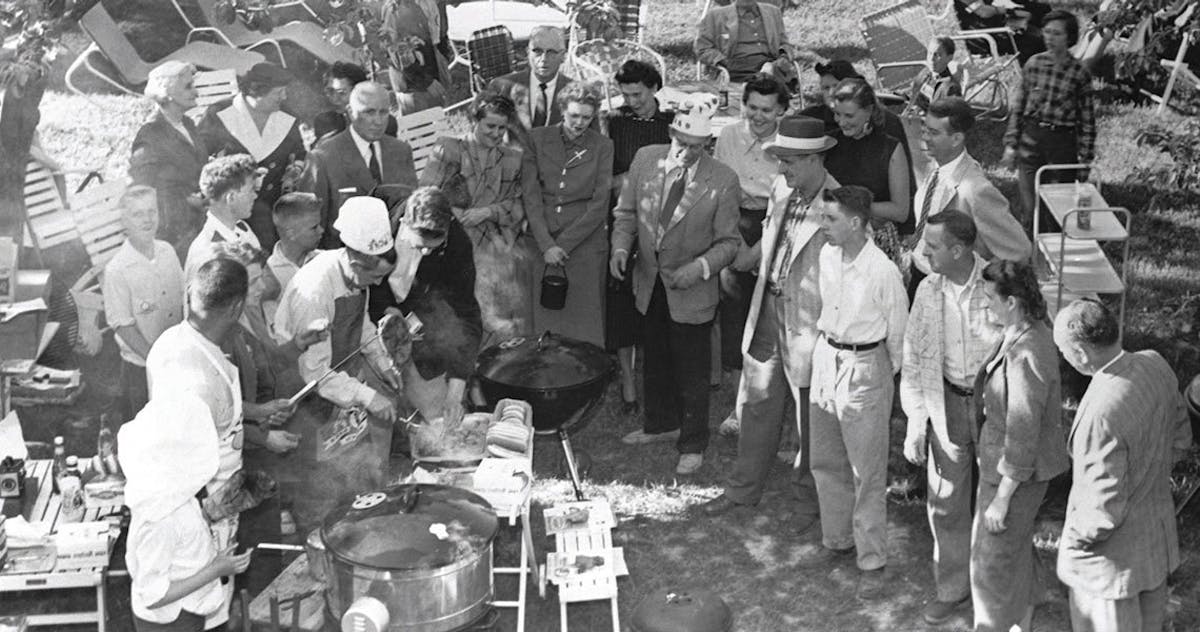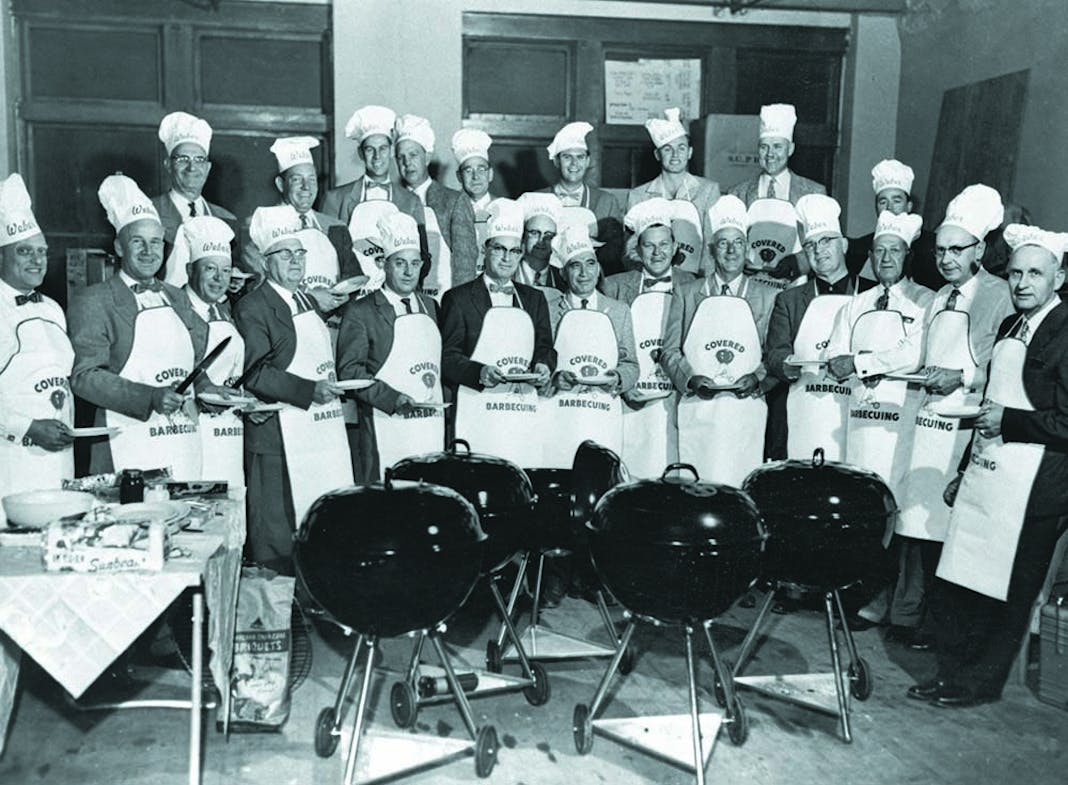The narrative of Weber is rich with innovation, skilled craftsmanship, and a deep love for outdoor cooking, fundamentally changing how we grill today. From its modest beginnings to its rise as a globally renowned brand, Weber has established itself as a benchmark for quality in the realm of outdoor barbecues. In this article, we will explore Weber's history, highlighting the key moments that have shaped the company and its legendary offerings.
The Birth of the Kettle Grill: Weber's Humble Beginnings
Weber's history traces back to 1952 when George Stephen Sr., a welder at Weber Brothers Metal Works in Chicago, created what would become the world’s most recognized charcoal grill—the Weber Kettle Grill. Before this invention, grilling often led to uneven cooking, primarily due to a lack of temperature control. Frustrated by his grilling experiences, George Stephen aimed to devise a solution. He repurposed a buoy from his workplace to design a dome-shaped grill that ensured consistent and controlled cooking.
The Weber Kettle was more than just a grill; it marked a significant shift in grilling practices. Its rounded lid facilitated heat circulation around the food, while adjustable vents allowed for customizable airflow, granting users unprecedented control over their grilling. This blend of ingenuity and practicality laid the groundwork for a global barbecue sensation.

Growth and Development in the 1960s: Weber's Expansion Era
Following the triumph of the Weber Kettle, the company experienced significant growth. In 1958, George Stephen acquired the Weber Brothers factory, officially establishing Weber-Stephen Products LLC. During this transformative period, Weber refined its designs and broadened its product offerings to cater to the surging demand for outdoor cooking gear.
By the 1960s, grilling had become a central part of American culture, with Weber leading the charge. The brand became synonymous with quality, durability, and innovation, solidifying its status within the industry. Weber's commitment to excellence ensured that its grills were built to endure, earning a reputation for outstanding performance.
Pioneering Gas Grilling: The Genesis Series
As outdoor cooking trends evolved, Weber expanded into the gas grilling market. In 1985, the company launched the Genesis series, a groundbreaking line of gas grills that introduced a new level of convenience and precision for grilling aficionados.
The Genesis gas grills featured innovative multi-burner systems, allowing for distinct cooking zones, which enabled users to prepare various foods simultaneously at different temperatures. This development ushered in advanced grilling techniques like indirect cooking and smoking, vastly expanding culinary possibilities.
The Genesis series was not merely another gas grill; it was a revolutionary product. By merging the high-quality craftsmanship of their charcoal grills with the convenience of gas, Weber set a new industry standard. Today, the Genesis line is regarded as one of the most esteemed gas grill series globally.

Building a Grilling Community: Weber's Commitment to Customer Engagement
A crucial element of Weber’s enduring success lies in its dedication to customer education and fostering a community of passionate grilling enthusiasts. The company recognizes that its products are more than tools; they are essential for creating memorable experiences with loved ones.
To support this vision, Weber has invested significantly in customer education. The Weber Grill Academy, a worldwide network of grilling schools, offers practical classes that teach grilling techniques to individuals of all skill levels. From basic skills to advanced culinary practices, Weber empowers users to become skilled grillers.
In addition, Weber has nurtured a thriving community through its Weber Nation platform, where grillers from across the globe share tips, recipes, and experiences. This focus on customer interaction has been vital in cultivating brand loyalty and reinforcing Weber’s position as an industry leader.
Continuing the Tradition of Innovation: Weber's Modern Advancements
Weber’s commitment to innovation extends beyond the Kettle and Genesis series. Over the years, the company has continually redefined the possibilities in outdoor cooking. From smart grills controllable via smartphone apps to advanced grilling accessories, Weber remains at the forefront of the grilling industry.
The recent introduction of the Weber SmokeFire series has added even more versatility to outdoor cooking. These grills combine the convenience of pellet grilling with Weber's signature quality, allowing users to smoke, sear, and grill with precision. This is just one illustration of Weber’s ongoing innovation, adapting to the evolving needs of contemporary consumers.

Global Presence and Unwavering Quality: Weber's Commitment to Excellence
Today, Weber stands as a global brand, operating in over 40 countries. Its products are available in major retail outlets worldwide, with the name Weber synonymous with high-quality, reliable grills. Despite its global expansion, Weber remains steadfast in its dedication to quality. Every grill is designed to endure, ensuring that customers can enjoy the art of grilling for many years.
This commitment to excellence is evident in Weber's rigorous product testing and ongoing design improvements. From carefully selected materials to meticulous construction, Weber grills are built to withstand the elements while delivering an exceptional grilling experience.
Embracing Sustainability: Weber's Environmental Responsibility
As global awareness of environmental issues rises, Weber has taken proactive measures to ensure that its products are as eco-friendly as possible. The company is dedicated to sustainability, utilizing energy-efficient manufacturing processes and materials that minimize waste. Weber’s grills are designed for longevity, reducing the need for frequent replacements and their subsequent environmental impact.
Furthermore, Weber is continually seeking innovative ways to enhance grilling efficiency and sustainability, including the development of products that utilize cleaner energy sources, such as natural gas and electric grills. This commitment to sustainability positions Weber as a responsible and forward-thinking company in today’s environmentally conscious marketplace.
Conclusion: A Legacy of Quality and Innovation
Weber's history exemplifies the power of innovation, craftsmanship, and a relentless commitment to quality. From the iconic Kettle grill's invention to the trailblazing Genesis series and beyond, Weber has consistently revolutionized the outdoor cooking landscape. As the company evolves and expands, its legacy of excellence and innovation endures, solidifying its status as the preferred brand for grilling enthusiasts worldwide.
